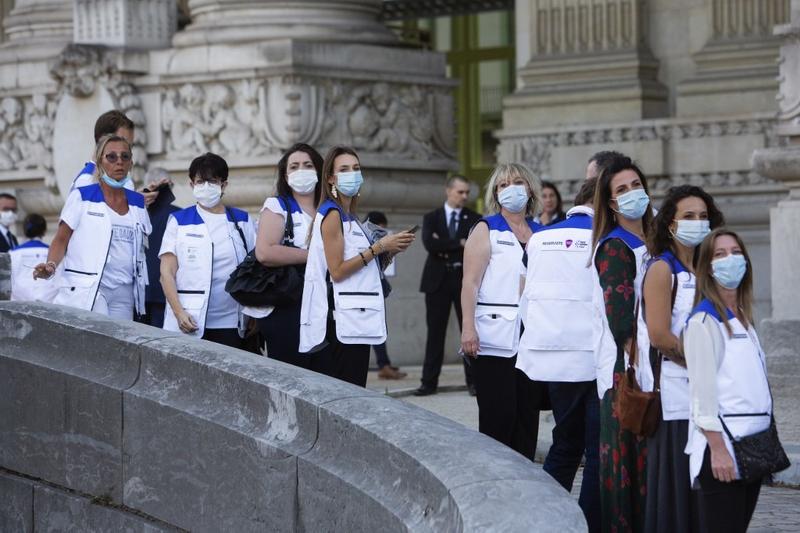 People wearing protective face mask and health reservist jackets queue outside the Grand Palais prior to a reception called by French Health Minister and gathering 800 medical staff that helped during the novel coronavirus (COVID-19) crisis in Paris, on July 13, 2020. (PHOTO / AFP)
People wearing protective face mask and health reservist jackets queue outside the Grand Palais prior to a reception called by French Health Minister and gathering 800 medical staff that helped during the novel coronavirus (COVID-19) crisis in Paris, on July 13, 2020. (PHOTO / AFP)
GENEVA / RIO DE JANEIRO / NEW YORK / WASHINGTON / DUBLIN / CAPE TOWN / RABAT / TRIPOLI / CAIRO / LISBON / SANTIAGO / LIMA / HARARE / BEIRUT / MEXICO CITY / BERLIN / MOSCOW / BRUSSELS / LAGOS / ACCRA - The French government will in next weeks make mask-wearing compulsory in all enclosed public places in order to contain the spread of coronavirus, President Emmanuel Macron said on Tuesday.
"We have signs that it (the virus) restarts a little," said Macron in a televised interview on the country's Bastille Day. He stressed the necessity to respect social distancing and reinforce testing capacity to contain the spread of the virus, while reassuring that "we are prepared" in case a second wave hits.
Spain
Spain’s Catalonia region on Tuesday issued a new order to place around 160,000 residents of the Lleida area under confinement to stem a surge in coronavirus infections, defying a judge’s ruling that such a step was unlawful.
The new restrictions, which still need to be approved by another judge after the conflicting orders provoked confusion among residents, would come into force in the city of Lleida and seven towns around it on Wednesday and last for 15 days, Catalan government spokeswoman Meritxell Budo said.
The regional government was confident the judge would approve the new decree issued as it gives Catalan authorities a stronger legal footing in tackling outbreaks, she said.
The new restrictions would only allow people to leave their homes for specific activities like working, buying groceries or exercising. Gatherings of more than 10 people would be banned, she said.

A traveler wearing a protective face mask wheels in Terminal A at Tegel Airport in Berlin, Germany, on Tuesday on July 7, 2020. (KRISZTIAN BOCSI / BLOOMBERG)
EU
The European Union (EU) will recommend keeping its external borders shut to Americans and most other foreigners for at least two more weeks as fears grow of a second coronavirus wave, according to three officials familiar with the matter.
Member-government envoys in Brussels on Tuesday plan to urge no expansion of a list of 15 countries -- Canada, Japan, South Korea and China among them -- whose residents were given the green light two weeks ago to visit the EU, officials said on the condition of anonymity
Member-government envoys in Brussels on Tuesday plan to urge no expansion of a list of 15 countries -- Canada, Japan, South Korea and China among them -- whose residents were given the green light two weeks ago to visit the EU, the officials said on the condition of anonymity.
The diplomats may also recommend shortening the list to 13 states by removing Serbia and Montenegro as a result of new infections there, two of the people said.
The plan marks the first biweekly review of a July 1 EU move to loosen a pandemic-induced curb on non-essential travel to the bloc.
A resurgence in virus cases around the world is hampering European efforts to emerge from national lockdowns and revive domestic economies as the summer tourist season gets underway.
The ban on non-essential travel to the EU has so far largely showcased voluntary coordination among member countries under the aegis of the European Commission, the 27-nation bloc’s executive arm, which formally has no decision-making power over the matter. Health policy in Europe is primarily a national responsibility.
Still, some EU capitals are going their own ways. European airline and airport groups last week criticized the failure of member countries to uniformly follow the recommendation regarding the July 1 loosening, citing “a patchwork system of travel restrictions and border controls throughout Europe.”
WHO
There will be no return to the "old normal" for the foreseeable future as a result of the ongoing COVID-19 pandemic, and too many countries are still headed in the wrong direction, the chief of the World Health Organization (WHO) warned on Monday.
"The virus remains public enemy number one, but the actions of many governments and people do not reflect this," said WHO Director-General Dr Tedros Adhanom Ghebreyesus at a regular briefing on Monday.
He noted that mixed messages from leaders are undermining trust, which is the most critical ingredient of any response, while the only aim of the virus is to find people to infect.
Things are going to "get worse and worse and worse," he warned, unless governments communicate clearly with their citizens and roll out a comprehensive strategy focused on suppressing transmission and saving lives, while populations follow the basic public health principles of physical distancing, hand washing, wearing masks, coughing etiquette and staying home when sick.
ALSO READ: WHO reports record daily spike in global cases, up over 228,000
COVID-19 has been gaining its momentum lately. According to the WHO chief, Sunday saw a record of 230,000 cases reported to WHO, of which almost 80 percent were from just 10 countries and about half from just two countries.
"But it does not have to be this way," Dr. Tedros implored, asking every single leader, government and individual "to do their bit to break the chains of COVID-19 transmission and end the collective suffering."
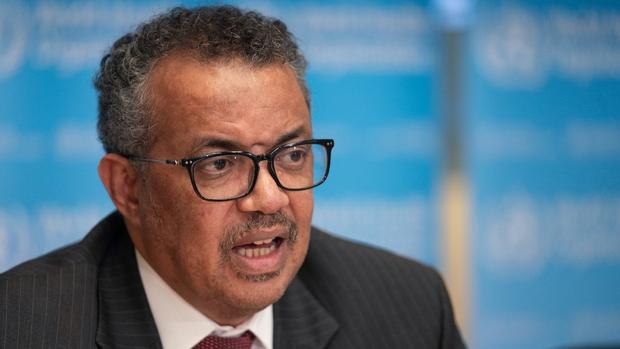 This shows World Health Organization Director-General Tedros Adhanom Ghebreyesus speaking at the WHO headquaters in Geneva on March 16, 2020. (PHOTO / AFP)
This shows World Health Organization Director-General Tedros Adhanom Ghebreyesus speaking at the WHO headquaters in Geneva on March 16, 2020. (PHOTO / AFP)
To control the disease and get on with people's lives, Tedros said, three things are required. The first is to focus on reducing mortality and suppressing transmission; the second is to focus on an empowered, engaged community that takes individual behavior measures in the interest of each other.
And the third is a strong government leadership and coordination of comprehensive strategies that are communicated clearly and consistently, he said.
"We weren't prepared collectively, but we must use all the tools we have to bring this pandemic under control. And we need to do it right now," he added.
Global toll
Global confirmed COVID-19 cases topped 13 million on Monday, reaching 13,006,764 as of 4:34 pm local time (2034 GMT), according to the Center for Systems Science and Engineering at Johns Hopkins University.
A total of 570,776 people worldwide have died from the disease, the data showed.
The United States suffered the most from the pandemic, with 3,346,246 cases and 135,477 fatalities; Brazil followed with 1,864,681 cases and 72,100 deaths, the tally showed.
Countries with more than 300,000 cases also include India, Russia, Peru and Chile, according to the CSSE.
Ukraine
A total of 54,771 COVID-19 cases, with 1,412 deaths, have been registered in Ukraine as of Tuesday, while 27,154 patients have recovered, according to the country's health ministry.
A total of 638 people tested positive for COVID-19 in Ukraine in the past 24 hours, while 651 patients have recovered, the ministry said.
Belarus
Belarus reported 155 new confirmed COVID-19 cases on Tuesday, taking its total to 65,269, said the country's health ministry.
There were 307 new recoveries in the last 24 hours, taking the total to 55,799, the ministry added.
So far, 474 people have died from the disease across the country, including six deaths in the last 24 hours, the ministry said.
As of Tuesday, over 1,144,000 COVID-19 tests have been conducted across the country, according to official figures.
Austria
Austria added 10 countries to its aircraft landing ban, while allowing flights from Milan again. Aircraft coming from Romania, Bulgaria, Albania, Serbia and the other non-EU countries of former Yugoslavia, as well as Egypt and Moldova, won’t be allowed to land in Austria starting Thursday, according to a new decree.
Belgium
Belgium, once hard-hit, reports zero coronavirus deaths for first time since March
Belgium, which has reined in the coronavirus after becoming the worst-hit mid-sized country in the world, reported zero new coronavirus-related deaths in 24 hours on Tuesday for the first time since March 10.
As in many European countries that were hard-hit by the pandemic in March and April, Belgium sharply reduced infections by imposing a lockdown, which is now being lifted.
The total number of deaths reported by the national public health institute Sciensano remained at 9,787. In the country of 11.5 million people, that works out to around 850 deaths per million, worst in the world apart from the tiny city state of San Marino. The peak daily death toll was 343 on April 12.
The curve of confirmed infections has flattened dramatically, with a total of 62,781, though the daily average of new cases in the last seven days, at 95, was up 11 percent from the previous week.
Facing a potentially risky summer with its citizens taking vacations abroad, Belgium is vastly more prepared than at the start of the year when skiing holidaymakers brought the new coronavirus back, health minister Maggie de Block told Reuters last week.
The so-called reproduction rate, a key figure that shows the average number of infections caused by each person with the virus, remained below one at 0.86.
The Belgian government is meeting on July 15 to discuss further easing of lockdown measures, after making face masks mandatory in shops, cinemas and museums on July 10.
Brazil
Brazil President Jair Bolsonaro said on Monday he is feeling “very good” and will return to work if he tests negative for the new coronavirus on Tuesday, but that he will continue to isolate himself until he is free of the virus.
The right-wing president told broadcaster CNN Brasil he has not felt out of breath, nor has he lost his sense of taste.
“I am very well,” Bolsonaro said. “Tomorrow is scheduled - I don’t know if it’s confirmed - a new exam. And if everything is good, we’ll go back to work. Otherwise, we wait a few days.”
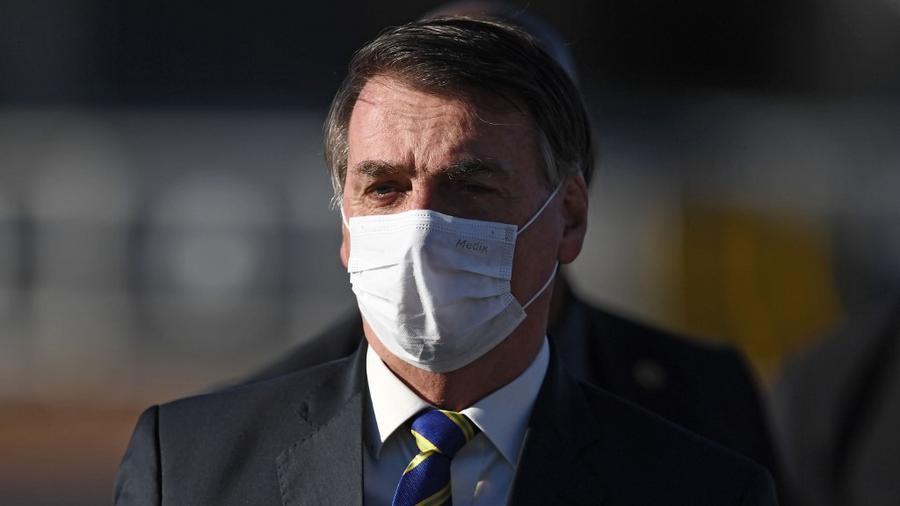 Brazilian President Jair Bolsonaro wears a face mask as he arrives at the flag-raising ceremony before a ministerial meeting at the Alvorada Palace in Brasilia, on May 12, 2020. (PHOTO / AFP)
Brazilian President Jair Bolsonaro wears a face mask as he arrives at the flag-raising ceremony before a ministerial meeting at the Alvorada Palace in Brasilia, on May 12, 2020. (PHOTO / AFP)
Bolsonaro tested positive for the novel coronavirus on Tuesday last week, after coming down with a fever. By Wednesday, he said he was already doing very well, crediting his use of the anti-malarial drug hydroxychloroquine - unproven for treating coronavirus - for his mild symptoms.
Brazil is the second-worst hit country by the global coronavirus pandemic after the United States. On Tuesday, the Health Ministry registered 20,286 new confirmed cases of the disease, bringing the cumulative total cases to nearly 1.9 million, while more than 72,000 people have died from the virus in Brazil.
Chile
Chile on Monday reported a total of 317,657 people have tested positive for COVID-19, and 7,024 people have died from the disease since the start of the outbreak.
In the past 24 hours, tests detected 2,616 new cases of infection and 45 more patients died from the illness, the Health Ministry said.
Currently, 1,931 COVID-19 patients are being treated in intensive care units, including 1,613 on ventilators and 341 in critical condition.
Health authorities have carried out a total of 1,310,265 tests, including 17,467 in the previous 24-hour period.
ALSO READ: The clever game of the coronavirus
Some 24,077 cases are considered to be active, while 286,556 people are reported to have recovered from the disease.
In recent weeks, the ministry has reported an improvement in pandemic numbers, saying they reflect a decline in new cases.
Chile declared a state of catastrophe months ago to better enforce lockdown and social distancing measures with the help of the army and police force, including a nighttime curfew.
Egypt
Egypt confirmed on Monday 931 new COVID-19 infections, raising the total number of cases in the country since mid-February to 83,001, said the health ministry.
It is the fifth consecutive day for the country's daily COVID-19 infections to be below 1,000 since May 28.
Meanwhile, 77 patients died from the virus, bringing the death toll 3,935, while 556 others were cured and discharged from hospitals, increasing the total recoveries to 24,975, Health Ministry spokesman Khaled Megahed said in a statement.
 Yemeni women residing in Egypt visit the Giza Pyramids necropolis on the southwestern outskirts of the Egyptian capital Cairo on July 1, 2020 as the country eases restrictions put in place due to the COVID-19 coronavirus pandemic (KHALED DESOUKI / AFP)
Yemeni women residing in Egypt visit the Giza Pyramids necropolis on the southwestern outskirts of the Egyptian capital Cairo on July 1, 2020 as the country eases restrictions put in place due to the COVID-19 coronavirus pandemic (KHALED DESOUKI / AFP)
Egypt announced its first confirmed COVID-19 case on Feb 14 and the first death from the highly infectious virus on March 8.
The country resumed international flights on July 1 after more than three months of suspension, amid a "coexistence plan" to maintain anti-coronavirus precautionary measures while resuming economic activities.
The government has recently lifted a partial nighttime curfew it imposed over the past three months, and reopened restaurants, cafes, theaters and cinemas, as well as hotels, museums and archeological sites for tourists, all with limited capacity.
Germany
German Health Minister Jens Spahn on Monday urged German vacationers to follow COVID-19 social distancing rules, saying that Germany could prevent a second wave of the coronavirus pandemic in the autumn given continued public vigilance.
He made the remarks at a press conference where he criticized German people who failed to wear masks or keep the recommended safe social distance while on summer vacation abroad.
The health minister said he was "very worried" by a video showing German tourists partying on the Spanish island of Mallorca over the weekend.
The video showed German tourists drinking, sometimes from the same bottle, hugging, singing and dancing outside bars and terraces on Friday evening, disregarding social distancing rules.
Spahn said it was important to remain vigilant, and that he understood the "impatience" of people, "but where there are parties the infection risk is particularly high."
"That's why we have to try particularly now in the holiday season to prevent infections. We don't automatically have to expect a second wave in the autumn and winter. Together, as a society, we can prevent that, as we did once before: breaking the wave and keeping the pandemic in check," he noted.
Germany’s coronavirus infection rate dipped, while the number of new cases stayed significantly below the level at the height of the outbreak.
There were 261 new cases in the 24 hours through Tuesday morning, bringing the total to 200,180, according to data from Johns Hopkins University. That compares with 210 the previous day and almost 7,000 at the peak of the pandemic in late March. There were three new fatalities, increasing the total to 9,074. The daily death toll has remained below 50 since the end of May.
Ghana
Ghana confirmed 470 more infections of the novel coronavirus early Tuesday, bringing its total case count to 24,988, the latest update from the Ghana Health Service said.
The number of recovered and discharged cases increased to 21, 067, with 880 more cases discharged from treatment.
The death toll from COVID-19 remained at 139 in the West African country, while the number of active cases stood at 3,782.
Ghana's social distancing measures are still in place to prevent a further community spread of the pandemic.
Ireland
Wearing a mask or face covering on Ireland's public transport is a must starting from Monday or one could face a fine of 2,500 euros (US$2,837) or an imprisonment of six months or even both of them, according to new regulations issued by the Irish government.
Under the new regulations, all passengers on public transport, whether it is on a train, tram, bus or taxi, must wear a mask or face covering and public transport operators have the authority to deny the entry of any passengers who fail to do so.
ALSO READ: Virus: Ireland may tighten rules at airports after criticism
If passengers fail to comply with the new rules without a justified excuse, police will step in to solve the issue, according to the new regulations, which are aimed at avoiding a second hit of the COVID-19 pandemic in the country as Ireland is reopening its society and business.
Ireland reported its first confirmed case of COVID-19 at the end of February. To date, more than 25,000 infections have been reported in the country with over 1,700 fatalities, according to the Department of Health.
The situation of the pandemic in Ireland has shown a consistent improvement over the last couple of months after reaching a peak in April. Nevertheless, local public health officials and experts are very concerned about some new trends.
Lebanon
Lebanon's number of COVID-19 infections increased on Monday by 85 cases to 2,419, while the number of deaths remained 36, the National News Agency reported.
The syndicate of nurses in Lebanon warned against a further increase in the number of infections which would impose threats to citizens, urging people to take necessary precautionary measures by wearing masks and washing their hands.
Libya
The National Center for Disease Control of Libya on Monday reported 79 new COVID-19 cases, bringing the total confirmed cases in the country to 1,512.
The center said in a statement that it received a total of 1,232 suspected samples, of which 79 were tested positive.
Among the total confirmed COVID-19 cases in Libya, there are 367 recoveries and 40 deaths, the center said.
ALSO READ: WHO: Almost a third of COVID-19 samples show mutation
Libyan authorities have taken a series of protective measures against the coronavirus, including closing the country's borders, schools and mosques and banning public gatherings as well as imposing a curfew.
Libya reported the first COVID-19 case in March, and the first death in April.
Mexico
Mexico registered 4,685 new COVID-19 cases in the last 24 hours, bringing the nationwide count to 304,435, the country's health ministry said Monday.
Meanwhile, a total of 485 new deaths were reported, taking its total to 35,491, the ministry said.
Also on Monday, Mexican Finance Minister Arturo Herrera tweeted that he has recovered from COVID-19 as he tested negative for the virus over the weekend.
Morocco
A total of 191 new COVID-19 cases were confirmed in Morocco on Monday, bringing the total number of cases to 15,936.
The number of people cured has increased to 12,934 with 651 new recoveries, said Hind Ezzine, head of the Department of Epidemic Diseases of the Ministry of Health, at a regular press briefing.
Ezzine added that the country's COVID-19 death toll stood at 255, as five new fatalities were recorded in the last 24 hours.
Nigeria
Nigeria continued to witness rapidly rising COVID-19 cases with the country reporting 595 new cases on Monday night, bringing the country's total to 33,153.
The total cases included 744 deaths and 13,671 recoveries amid plans by the presidential task force to develop an exit strategy beyond September 2020.
The new infections were recorded in 19 states and the Federal Capital Territory, said a statement released by the Nigeria Center for Disease Control (NCDC).
The Nigerian government had in March inaugurated a presidential task force to manage the COVID-19 outbreak with a six months' timeline to deliberate on the terms of references given to them.
Boss Mustapha, chairman of the task force and secretary to the government of the federation, told reporters in Abuja on Monday that the task force would develop an exit strategy beyond September 2020.
"An enhanced risk communication strategy becomes inevitable when we realize that within the last 24 hours, the world witnessed the largest single-day cases of 230,370, while in Nigeria, last week we recorded the highest weekly fatality of 70 deaths," Mustapha said.
"The rising fatalities in Nigeria are not unconnected with denial and delay in seeking help," he added.
The West Africa nation initially imposed a nationwide lockdown in March to curb the spread of the virus and introduced phased relaxation on the restrictions from May, citing the lockdown's impact on the economy and people's lives.
Peru
Peru on Monday said the number of its COVID-19 cases has risen to 330,123, after tests detected 3,797 new cases in the past 24 hours.
The death toll rose to 12,054, the Health Ministry said in its latest pandemic report.
"Of the positive cases, to date 221,008 people have completed their period of quarantine at home or have been discharged from a health center," the report added.
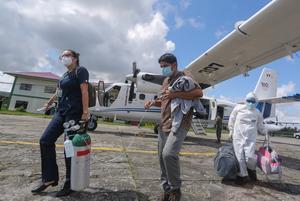 A medical worker (right) showing symptoms of the novel coronavirus COVID-19 descends from a small aircraft in Iquitos, in the Amazon Forest in northern Peru, upon arriving from San Isidro community, on July 11, 2020. (CESAR VON BANCELS / AFP)
A medical worker (right) showing symptoms of the novel coronavirus COVID-19 descends from a small aircraft in Iquitos, in the Amazon Forest in northern Peru, upon arriving from San Isidro community, on July 11, 2020. (CESAR VON BANCELS / AFP)
Peru has resumed economic activity in most of the country, with just seven regions still under lockdown due to high rates of transmission.
The Ministry of Production on Monday issued a regulation that calls on restaurants and similar establishments to operate at just 40 percent of capacity starting July 20 to facilitate social distancing.
These businesses should create their own control and compliance measures to minimize the spread of COVID-19, the ministry said.
Portugal
The Portuguese government on Monday announced to extend the "state of calamity" for 19 most-affected parishes in five municipalities in Greater Lisbon for another 15 days, Portuguese Lusa News Agency reported.
Under the Portuguese Constitution, there are three emergency levels -- "state of emergency", "state of calamity" and "state of alert."
Under the "state of calamity", people are allowed to leave home only to buy essential goods such as food or medication, or to travel to and from work. Gatherings are limited to five people, and fairs are prohibited.
Minister of State for the Presidency, Mariana Vieira da Silva, said at Monday's press conference that the extension decision was made after the government's discussion with leaders of the five municipalities -- Lisbon, Sintra, Loures, Amadora and Odivelas.
READ MORE: Myth buster: 10 rumors about novel coronavirus
"In all of these five municipalities, in the last seven days, a decreasing trend of new cases can be seen. (But) this is a trend that needs to be consolidated and we are not in a position to rest, it needs strong monitoring," she was quoted by Lusa as saying.
Two weeks ago, the five municipalities were put under partial lockdown in the "state of calamity."
According to Vieira da Silva, the incidence of new cases per 100,000 inhabitants in these five areas decreased from 154 to 121.
According to the bulletin of the Directorate-General of Health (DGS), there have been 46,818 confirmed cases of infection and 1,662 deaths as of Monday.
In the past 24 hours, Portugal registered two more deaths and 306 new cases of infection, 254 of which were in Greater Lisbon which consists of nine municipalities, according to DGS.
Russia
Russia on Tuesday reported 6,248 new cases of the novel coronavirus, pushing its confirmed national tally to 739,947, the fourth largest in the world.
Officials said 175 people had died in the last 24 hours, bringing the official death toll to 11,614, while 512,825 people have recovered, including 8,804 over the last 24 hours, according to the statement.
Moscow, the country's worst-hit region, reported 613 new confirmed cases, taking its tally of infections to 230,642.
South Africa
South Africa's daily confirmed COVID-19 cases have surpassed 10,000 for days running, indicating the approaching of the infection peak, Health Minister Zweli Mkhize said on Tuesday.
In the past 24 hours, 11,554 new cases were reported, bringing the total number to 287,796, the minister said in his daily update.
The total number of COVID-19 related deaths stood at 4,172, of which 93 were newly added deaths, Mkhize said.
Gauteng Province, the new epicenter in the country, recorded a cumulative number of 103,713 cases, an increase of 5,282 from the previous announcement, said Mkhize.
READ MORE: WHO official cites AIDS as guide to addressing virus pandemic
Of the total patients in the province, 4,624 were admitted to public and private facilities, according to the minister.
Gauteng health workers were trying to find more beds for COVID-19 patients, he said.
"In Gauteng, the numbers are rising very fast and we want to be sure that we match these numbers," said Mkhize.
The government was concerned about the rapid increase in the number of infected people who required hospitalization, said Mkhize.
However, he assured South Africans that the country has enough hospital beds for COVID-19 patients.
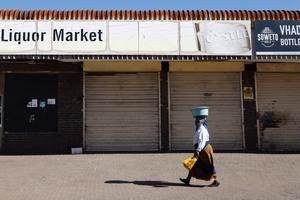 A woman walks past a closed liquor shop in Soweto, on July 13, 2020. - South African President Cyril Ramaphosa on July 12, 2020 re-imposed a night curfew and suspended alcohol sales as COVID-19 coronavirus infections spiked and the health system risked being overwhelmed. (MICHELE SPATARI / AFP)
A woman walks past a closed liquor shop in Soweto, on July 13, 2020. - South African President Cyril Ramaphosa on July 12, 2020 re-imposed a night curfew and suspended alcohol sales as COVID-19 coronavirus infections spiked and the health system risked being overwhelmed. (MICHELE SPATARI / AFP)
"We have added 27,800 beds which have been put onto the system right across the country and we believe that these beds are important," the minister said.
The government is also working to ensure that patients are not just admitted to hospitals but also have access to oxygen piping, Mkhize said.
The government was calling on clinicians to bring in more oxygen tanks to hospitals as this was becoming a key factor in the fight against the COVID-19 pandemic, according to Mkhize.
With more and more cases expected in the coming days, the country needs to add an additional 12,000 beds just to make sure that the cases don't exceed the capacity, Mkhize said.
Efforts were being made to acquire more hospital beds, he said.
United Kingdom
Face coverings will be compulsory in all shops in England from July 24 as part of attempts to stop the spread of coronavirus, Health Secretary Matt Hancock will announce Tuesday.
The move, which will be enforced by fines, comes after pressure from labor unions, business lobbyists and opposition politicians, who accused Prime Minister Boris Johnson’s government of lacking clarity in its guidance for defeating the pandemic.
As of Sunday morning, 289,603 people have tested positive for the disease in Britain, a daily increase of 650, according to the British Department of Health and Social Care.
United States
The United States on Monday recorded 59,222 new COVID-19 cases in the past 24 hours, bringing the tally of confirmed COVID-19 cases over 3.36 million, according to Johns Hopkins University.
Another 411 deaths were reported in the past 24 hours, bringing the total death toll to 135,582 in the country.
The surge of coronavirus infections has pushed some states to reinstate tougher anti-epidemic measures.
The surge in COVID-19 cases across the United States has resulted in delays in processing and delivering test results, a leading US diagnostic service company said.
Quest Diagnostics, one of the companies performing a significant amount of COVID-19 testing in the United States, said its average time to get test results back is now "7 or more days" for everyone except the highest-priority patients, meaning people who are hospitalized or symptomatic health care workers.
"Despite our rapid scaling up of capacity, soaring demand for COVID-19 molecular diagnostic tests across the United States is slowing the time in which we can provide test results," said the company in a statement.
"We attribute this demand primarily to the rapid, continuing spread of COVID-19 infections across the nation but particularly in the South, Southwest and West regions of the country," said the statement.
READ MORE: In first, Trump wears mask in public
The company is able to perform up to 125,000 molecular diagnostic tests a day, almost double its capacity two months ago, and expects to have the capacity for a 150,000 tests a day by the end of July.
"Despite that dramatic increase, demand for testing is increasing even faster. As a result, our average turnaround time for reporting test results is slightly more than 1 day for our priority 1 patients. However, our average turnaround time for all other populations is 7 or more days," said the company.
More than 3,353,000 COVID-19 cases have been reported in the United States with the fatalities surpassing 135,500 as of Monday evening, according to a tally by Johns Hopkins University.
Zimbabwe
Zimbabwe registered 49 new cases of COVID-19 on Monday, bringing the country's tally to 1,034.
One patient has died and 15 others have recovered from the infection during the past 24 hours, raising the total number of deaths to 19 and recoveries to 343, the Ministry of Health and Child Care said in a statement.


